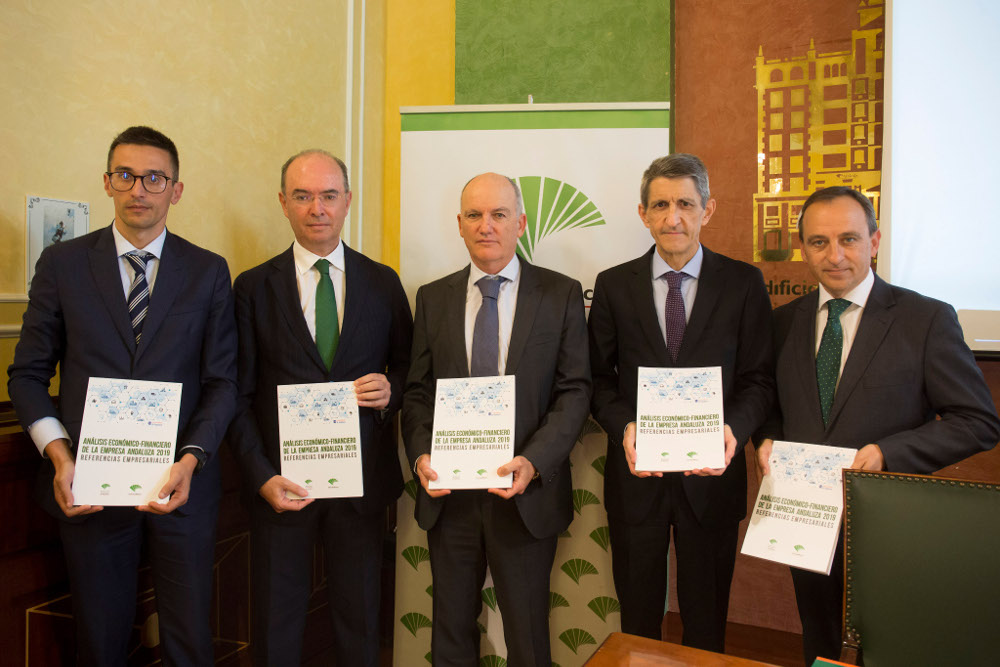Unicaja Banco has published the report Análisis Econónomico-Financiero de la Empresa Andaluza 2019 (Economic and Financial Analysis of Andalusian Companies), prepared by Analistas Económicos de Andalucía (Grupo Unicaja Banco’s research company).
The preparation and publication of this report falls within Unicaja Banco’s policy to support the business sector and to foster entrepreneurship in Andalusia.
The report is based on a detailed analysis of the annual accounts presented by over 90,000 companies at the trade registers of Andalusia, corresponding to the financial year 2017 –latest year with information available for all the companies which compose the sample-. This edition includes an advance of the results of Andalusian companies in 2018.
Together with the publication of the report, the website (cba.analistaseconomicos.com) has been updated for consultation of the mentioned work and it contains the economic and financial information on which the analysis is based.
The report is structured as follows: after a first introductory section and the synthesis of the main results, a review is made of the economic context in which Andalusian companies have carried out their activities. It focuses then on their demographic features (nature of the business activity, size and geographical location) and their evolution in recent years.
In a second block, the report analyses the companies which, because of their economic and financial behavior, are regarded as ‘Business References’, under three criteria: capacity to generate resources (leaders), capacity to increase sales (gazelles) and capacity to obtain a high profitability (high profitability). After this, attention is paid to the economic and financial evolution of regional companies during the period 2015-2017, although the core of the examined information is the last year.
The economic and financial analysis ends with an advance of the results for the year 2018. Finally, the ‘Economic and Financial Reports’ of the main aggregated and a ‘Dictionary of economic and financial terms’ are included as an annexes, to make it easier to understand and construe the document.
The main results of the report are explained below:
Business demographic dynamics
In 2018, the Andalusian economy continued with the economic growth path started in the second semester of 2013, registering an increase of around 2.4% in production. In this context, at the beginning of the year 2018, 509,137 companies developed their activities in Andalusia, 7,392 more than the previous year (1.5% year-on-year).
Regarding business density, in Andalusia there are 60.7 companies per thousand inhabitants, 0.8 more firms than in the previous year, and 4.9 more than in 2014.
With regard to size, businesses without employees grew by 0.6%, companies with 1 to 9 employees, by 2.1%, whereas those with 10 to 99 employees and those with more than 100, grew at a faster pace, at a rate of 6.5% and 6.6% respectively.
Considering the activity sector, non-commercial services gather 57.1% of the total of companies in the region; commercial services, 26.4%; construction, 10.7%, and industry, 5.7%. In comparison with the previous year, companies from the industrial sector grew by 5.7%, construction companies by 3.5%, and those from the service sector, by 1.8%.
From a territorial perspective, Malaga has 123,109 companies (24.2% of the total of the region); Seville, 117,385 (23.1%); Cadiz, 60,690 (11.9%); Granada, 59,115 (11.6%); Cordoba, 47,209 (9.3%); Almeria, 42,931 (8.4%); Jaen, 34,030 (6.7%) and Huelva, 24,668 (4.8%). Only Malaga province, with a business density of 75 companies per thousand inhabitants, surpasses the national average (71.4).
Social economy companies operating in Andalusia in 2018 rise to 5,688, of which 66.4% are cooperatives and the remaining 33.6%, labour societies. Andalusia is home to 19.8% of the total of social companies in Spain, followed by Cataluña (16.3%) and Comunidad Valenciana (10.7%). The provinces with the largest share in these companies are Seville (20.8%), Málaga (15.2%), Jaén (12.6%) and Córdoba (12.2%).
On the other hand, 2018 saw the creation of 16.016 mercantile companies in Andalusia. This figure represents 16.8% of the total national. In contrast, the number of dissolved companies reached 3,335 (14.9% of the total national), of which 8.6% were due to merger transactions.
Business References
With the data for the period 2014-2017, 7,070 companies in Andalusia meet at least one of the three excellence criteria considered: 2,487 businesses are regarded as leaders (2.8% of the available sample), 2,575 as gazelles (3.8%) and 2,008 as high profitability (2.6%). The demanding conditions set are behind the fact that only 30 companies belong simultaneously to the three groups.
Considering size, medium-size enterprises have a higher relative weight in the category of leaders (43.5% of the total), exceeding the average distribution of the representative sample, while micro-enterprises excel in gazelles (67.1%) and in high profitability (85.8%).
As per sector distribution, the companies from the service sector represent 40.9% of leaders, and industry, 23.2%. In gazelles, services (38.6%) and commerce (30.3%) are the sectors with a higher number of companies. In high profitability, companies from the service sector provide nearly two thirds of the total (62.5%), 19.5 pp over the available sample.
From a territorial point of view, the province of Seville (27%) and Malaga (25%) show the largest concentration of business references in the region. The largest presence of leaders and gazelles is found in Sevilla, whereas most high profitability companies are located in Malaga.
According to the population size, 37.1% out of the total of business references are located in province capitals, 24.3% in large towns and 38.6% in towns with less than 50,000 inhabitants.
The highest relative weights observed in province capitals stand for leaders (40.7%) and for high profitability (39.4%), whereas gazelles are more represented in other cities and towns with less than 50,000 inhabitants (44.7%).
Economic and Financial Analysis 2017 and advance for 2018
In 2017, the sales (business turnover) of Andalusian companies increased by 12.1% (8.6% in the total national), presenting a slowdown in 2018, when it has reached a rate of around 6%. With regard to their average size, in 2017 large companies posted a growth higher than the regional total (15%). From the point of view of sectors, the largest increase has been registered in construction (23.5%). By provinces, the growth of companies in Granada (20.8%) and Cordoba (14.0%) stands over the regional average, with similar rates in Almeria, Jaen and Malaga.
The year result in Andalusia represents 5% of the business turnover, a 2.2 p.p. year-on-year increase, and the 2018 advance reaches 5.3%. Additionally, 67.2% of companies located in the region obtained positive results in 2017, a percentage similar to that of Spain (67.5%).
On the other hand, investment has increased by 3.3% in 2017, due to a growth of current investment (5.2%). Outlooks for 2018 suggest a rise of around 4.4%.
With regard to their financial structure, own funds increased by 5.6%, whereas in borrowed capital, the growth of short-term liabilities has been of 8.4%, accompanied by a 5.1% decrease in non-current liabilities. As per their origin, liabilities with credit institutions represent 17.4% of indebtedness, 0.6 p.p. less than in the previous year.
Regarding the performance of the business activity, an improvement has been noticed both in economic and financial profitability, reaching 4.3% and 8.6% respectively. In relation to economic profitability, the levels reached by small companies (4.5%) are to be remarked, as well as those of the industrial (5.5%) and commercial (5.1%) sectors.
Descarga el informe completo del 'Análisis Económico-Financiero de la Empresa Andaluza 2019'



